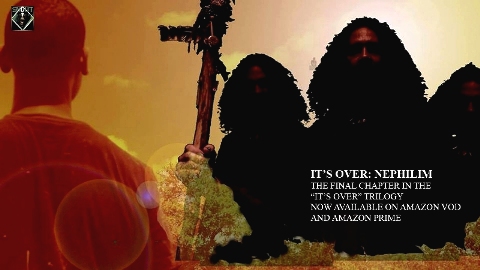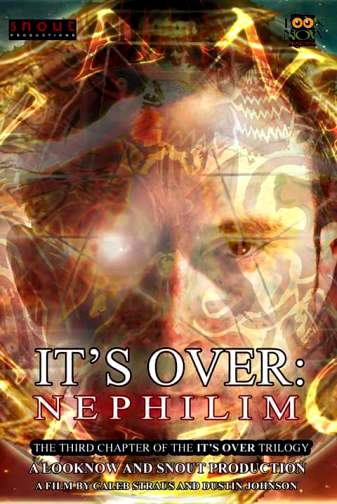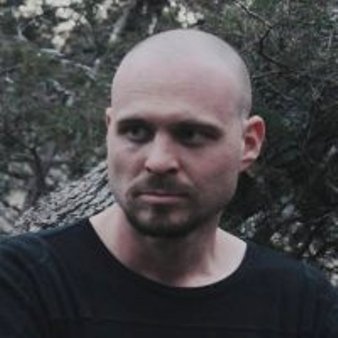

On this month's Special Page:
Caleb Straus explains what it's like to be an indie filmmaker
IN THE "SPECIAL PAGE" ARCHIVES:
Elizabeth Massie
Ramsey Campbell
Mathew Cade
Bat$hit!crazy
Ellen Datlow
Brent Monahan
Owen King

.jpg)
.jpg)
Oops, I became a filmmaker. Now what?
by Caleb Straus
I was going to start this article with "Life has a funny way of sneaking up on you,” but I immediately hit backspace as fast as my fingers would tap, after realizing how cliche` it was.
I'm still kind of mad at myself for it. Regardless, it's painfully true. Nine times out of ten, we don't end up where we start. Sometimes that can be a really beautiful thing.
Sometimes, it can scare the hell out of you.
More often than not, it's a combination between the two.
Let me back up. I'm a filmmaker. Let me rephrase that, I'm an independent filmmaker, which is its own niche entirely. It's the sort of thing that you don't necessarily look forward to telling your parents is your biggest aspiration. As far as planning my adult life goes, that was never part of the plan. It just happened.
I'll admit, from the ages of about ten to roughly fifteen, I made films with my best friend, Dustin Johnson (more on that crazy bastard later), and had a blast ripping off my favorite Hollywood features. People want to be all kinds of crazy things when they're kids. I don't know how many kids bother to figure out how to shoot footage with a VHS camcorder and edit it onto another VHS tape with two VCR's and a cheap over-dubbing unit from RadioShack, but come on— who hasn't dreamed of doing something that could make you famous at some point in their childhood?
Dustin and I met when we were eight years old, and shared a love for all things comic book, fantasy, sci-fi, and eventually of course, horror and loud, aggressive music. By the time we were in our late twenties, we were co-running and operating Snout Productions, a film company that had started as a record label for our own music projects.
During that time, people wanting to get into film would ask me for advice. It always rendered me a deer in headlights. We became filmmakers by accident. We had no idea what we were doing. However, when a friend or colleague asks for your two cents in this business, you scratch their back. After all, you never know when you'll need them to scratch yours. Hey, I think that was our first piece of advice in this article!
Yeah, yeah, more is coming. First is the history of Snout Productions.
When puberty hit, loud aggressive music took over any aspirations of making films. Maybe it was because other kids made fun of us for it. Maybe it was because girls became a thing for us. Maybe it was hearing Nine Inch Nails' The Downward Spiral, Pantera's Vulgar Display of Power, and White Zombie's Astrocreep 2000 for the first time and going, "Oh my God, we have to do THIS!"
Whatever part of our hormone-driven subconscious rearranged our priorities, this was the birth of our band that would go on to create music for nearly twenty years with Emzy Enzy (www.reverbnation.com/emzyenzy). The band consisted of only the two of us and some cheap synths. After all, Trent Reznor could make music with computers and keyboards, why couldn't we? Of course, we didn't even have a computer yet, but this was the 90's, kids. Only rich people had computers.
Over the course of our college years, Emzy Enzy evolved into not only a fully-functioning three piece industrial metal band, but it also gave birth to Snout Productions. The credo remained the same—make whatever we want to make, on our terms, and if it happened to poke someone in the eye, so much the better.
As Snout Productions, we created the It's Over films and accompanying Transmedia Universe. The Horror Zine has graciously reviewed all three films in the series, written by C. Dennis Moore.
Sadly, during production of the third film, Dustin unexpectedly passed away. The cast, crew, and myself buckled down and finished the film, and Emzy Enzy finished its final album as best we could without his leadership.
Subsequently, I buckled under the grief, and I shut Snout Productions down.
This story is important, because the following advice is coming to you from the perspective of someone who stumbled out of filmmaking, back into it, lost his best friend, nay, his brother while working on the project of a lifetime, shut his hopes and dreams down, tried to focus on his day job of teaching theatre, realized he was miserable, and opened Snout Productions back up, all in the span of about a year and a half.
Today, I am happy to say that Snout Productions is working on not one, but two short films, an album from a new music project, and even a book or two. Every filmmaker has a story behind their work, and usually, it is one of blood, sweat, and tears.
Mine is not special, but it is mine. I use this story as a preface to point out that the following list of tips is from my perspective, and can only be derived from my experience. Whether you are a director, a writer, an actor, or a musician, or you're like me and you're all of the above, we all love horror and sci-fi. We all exist on the fringes, and we all create because we must. Some who are far more "successful" than I may roll their eyes at what I am about to say. I'm just snarky enough to roll my eyes right back, so take it all with a grain of salt. But I sincerely hope you find this helpful:
1. If you aren't making your art for yourself first, you have no business making it for anyone else.
Loss will make you realize quickly that life is short. However, you shouldn't have to lose your best friend to know that you have to create for yourself first. I have always posited that the film industry needs much more punk rock in it than it currently has.
You have to trust your own taste. Further, you have to trust that if you like it, someone else will too. Never lose sight of the fact that what makes you want to make films is that you are a fan of them. Always be a fan. Be a fan of your own stuff. If you're not, why are you doing it? Further, watch your own movies. Do it often. You'll learn from both your successes and mistakes.
2. Don't wait for a break, and don't ask permission.
Robert Rodriguez made his first movie with almost no crew and almost no money. It launched his entire career.
When Dustin and I made the first It's Over installment, we shot it with three DV cameras, edited, scored, produced, directed and wrote everything ourselves, and cast ourselves and our friends (when you grow up in theatre, everyone you know is an actor) as the roles in the film.
We made it for nothing, and with nothing. We had no knowledge of filmmaking. We learned by making one. We had an idea, and we executed it.
We made a lot of mistakes, but we also got a lot right. We didn't submit our script to a studio. We didn't have any allusions that this was going to be our big break. We did it ourselves, with nothing to lose. It was the most fun we had ever had, and probably still the most fun I've ever had making a movie.
You want to make a movie? Make one. On your deathbed, you'll be able to look back and say you did it.
3. Don't follow the industry—carve your own path.
You could exhaust yourself trying to keep up with "market research" in this rapidly changing digital age. What is the best social media site to be on? How do I market? Who do I market to? What do I need to do to get noticed?
The more you think about this garbage, the less you'll think about what matters— getting better at making movies.
Should you use the internet? Absolutely! It's your best friend. But make your movie first. Make it the best you can. You can worry about how to get eyes on it later.
When you do get to that step, be creative! Take DVD's to your local movie store chains if you still have them. Put them on Vimeo (Youtube's quality is far inferior to Vimeo) and let people watch it for free until you make enough of a name for yourself to charge.
Get it out there in any way you can think of. Don't limit yourself to what marketing "experts" (ugh, I hate that word) insist you do. They don't know art, and they don't know you or your film. Follow your gut. It will never let you down, unless you let it down first.
4. Use the feedback you can use, and throw the rest away.
I have personally found that the most constructive feedback comes from a place of wanting to help make your vision as clear and accessible to an audience as possible.
The least constructive feedback comes from a place of wanting to change your vision into the vision of whoever is giving you the feedback. Horror writer C. Dennis Moore reviewed all three films in my It's Over franchise, and after the very first one, I began to request him specifically. He's brutally honest when something isn't working, but he gets It's Over. He understands the intention, and his feedback is centered on making that intention more effective. He doesn't make suggestions that would make an It's Over film not an It's Over film. He makes suggestions that would only make the intentions of the work land in the way we want them to.
Trust your vision and never ever let anyone water it down. Take the constructive feedback that will make you better, not different.
5. Do not give up. Ever.
I have faced every discouraging event you could imagine. I've lost actors to other commitments in the middle of filming and had to rewrite entire films. I've lost hard drives and had to go to data retrieval specialists. I've had to reschedule entire film shoots when actors came in from out of town because their manager or their agent pulled them for an audition for a movie with an A-lister.
Hell, I lost my best friend while making the final It's Over movie before he was done filming all his parts in an extremely crucial role no less!
If you are on this Earth to make films, nothing and no one, not even you, can change that. Stick with it. Stand by what you do, and don't give up.
You learn far more from your failures than you learn from your successes. Don't get discouraged. I'll spare you the suspense; you're never going to make the perfect film.
To quote my old man: "If you ever perfect your craft, and get to a point where you can learn no more, quit. Don't ever do it again."
You have nowhere else to go from perfection but down. Learn from every project you take on, and use that in the next one. Keep truckin', trucker!
I hope you can use some of this to make your ventures into filmmaking (or whatever medium you work in) more fulfilling. Notice I didn't say easier, I said more fulfilling.
If easy is what you seek, then frankly you are in the wrong business. This isn't easy. It's not even always fun.
But if you are a filmmaker, a writer, an actor, a poet, or an entertainment lawyer, you'll know pretty quickly. The choice is an illusion. Life is going to sneak up on you and tell you why you're here via your gut.
Listen to it. Like I said, it will never fail you. You should be far more worried about failing it.
Now get cracking! You have a lot of work to do.
Caleb Straus, MFA
Snout Productions Artistic Director
www.snoutproductions.org
About Caleb Straus

Caleb Straus is an actor, singer, composer, writer and director of theatre and film who lives on the outskirts of Austin, TX with his wife and three boys. He hails originally from Abilene, where he attended McMurry University, earning his BFA in Theatre in 2006. He subsequently completed a Master of Arts in 2010, and a Master of Fine Arts in 2016, both at Texas State University’s Department of Theatre and Dance with an emphasis in Directing. He has worked extensively in Hill Country Community Theatre, as well as Theatre and Film in Austin.
Caleb, along with co-founder Dustin Johnson founded Snout Productions for the purporse of creating and releasing the IT'S OVER trilogy in 2007. It also serves as an outlet for their musical creations including EMZY ENZY, PLUS, DISGRUNTLED EMBRYO, WURMHOLE, as well as their soundtrack work. Dustin sadly passed away in May of 2015 during production of IT'S OVER: NEPHILIM.
Straus runs Snout Productions as a testament to his fallen brother's memory.